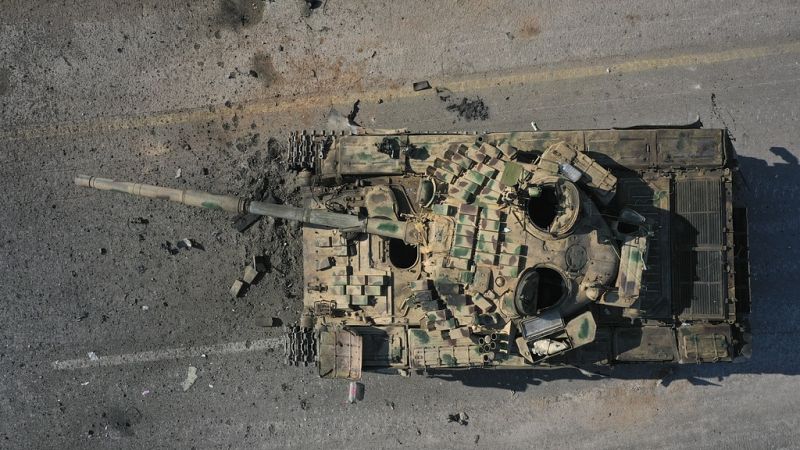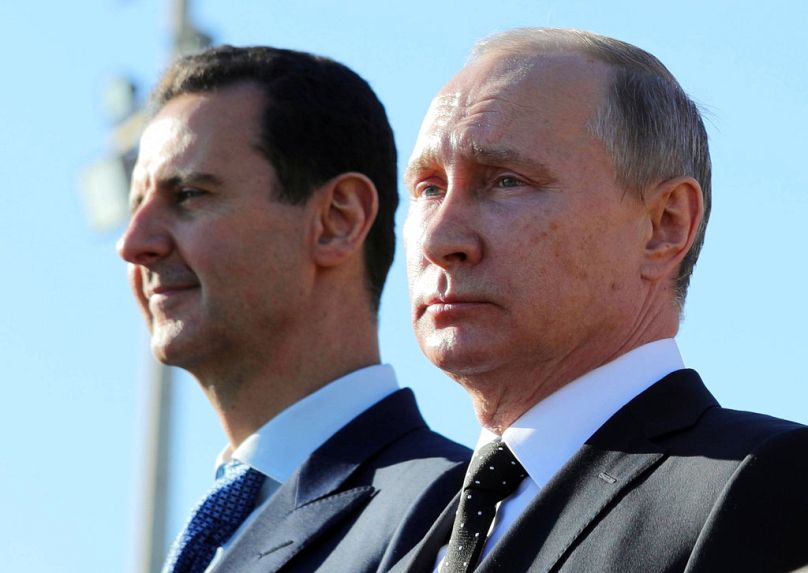Syria: How the conflict could impact migration and the war in Ukraine

After a shocking offensive that retook the city of Aleppo, Syrian rebels, led by members of the insurgent group Tahrir al-Sham, are making their way south on their country's M5 highway. If not stopped, they could reach the province of Homs before potentially breaking through to the northern Lebanese border.
This would be a key military achievement, cutting off Damascus from a large swathe of the Syrian Republic that is still controlled by Bashar al-Assad — as well as from the Mediterranean coast, Russia’s Tartus naval docks, and the Khmeimim military airport.
That would be a particularly humiliating setback. The infrastructure there was built by Moscow in 2015 during its war against anti-al-Assad factions. It would also be a political slap in the face for Russia, which has been a staunch supporter of the al-Assad dynasty since before the fall of the Soviet Union.
The Lebanon effect
The events in Syria will inevitably impact Lebanon, where a truce between Israel and Hezbollah is hanging by a thread.
Hezbollah is not only an Iranian proxy but a crucial part of al-Assad's operation to enforce his power, has been weakened by the war with Israel. If the Syrian insurgents reach Homs and the Lebanese border, Hezbollah will be cornered in Lebanon and cut off from a key logistics and supply route from Iran that passes through Syria and Iraq.
“One of the causes of what is happening today in Syria is the control of the Syrian-Lebanese borders to prevent the passage of strategic weapons into Lebanon,” Antoine Habchi, Lebanese Parliament's MP from the Bekka Valley, told Euronews.
“Turkey has tried to make sure that the Lebanese borders are not a route for the transfer of strategic weapons through Syria. Even al-Assad doesn't control passage through his own territory here, which is controlled by other factions and international forces, and notably Iran.”
Turkey's top diplomat, Hakan Fidan, said on Monday that the latest developments “show once again that Damascus needs to reconcile with its people and the legitimate opposition”.
Turkey has consistently sought to increase its leverage with al-Assad to boost its standing in the region and allow it to keep closer control of Kurdish separatists, as well as the oil-rich Syrian sanctuaries in semi-autonomous northern areas of the country.
A new refugee crisis?
Since the latest reignition of the Syrian conflict, thousands of refugees — a UN estimate has put the figure at 120,000 — have fled conflict zones for sanctuaries in the north.
As happened during the devastating first years of the war in Syria, Lebanon expects a major influx. Mass immigration just weeks after Israel launched its full-on offensive could destabilise the small Middle Eastern country even further — and there are also worries that displaced Syrians could start heading to Europe via dangerous routes as they did a decade ago.
This is one of the reasons why the US, UK, France and Germany have issued a joint statement calling for an urgent deescalation among all parties.
Habchi suggested that to get ahead of the problem, the EU should contribute to the setup of protected areas where refugees can be kept as safe as possible without having to leave the region altogether.
“The Aleppo region and the border region with Turkey will become safe, free from regime control. So we don't have to wait for the entire Syrian problem to be resolved before these refugees return to Syrian territory,” he said.
“The same humanitarian and financial aid provided by the European Union and the international community to the Syrian refugees in Lebanon could be provided by the international community to these refugees in well-secured zones (in Syria).”
Turkey, Iran, Russia and the US
Turkey has distanced itself from the insurgents’ offensive, treating it as an autonomous military initiative of the rebel groups and the Syrian Salvation Government.
“It would be wrong to explain the events in Syria as any foreign intervention,” Turkish Foreign Minister Hakan Fidan said on Monday, following a visit to Ankara by his Iranian counterpart, Abbas Arqchi.
That message was aimed directly at Tehran, but also indirectly at the Kremlin, a solid partner of Iran's in Syria.
The Syrian crisis is raising the stakes for Turkey on another front too: diplomatic sources speculate that if it plays its hand right in the region, Ankara could also gain leverage in any potential negotiations to bring Russia’s war in Ukraine to a conclusion.
The fall of Aleppo has exposed the Kremlin to the risk of military overreach, and has put its alliance with Tehran under stress because of their competing military objectives in the country. Russia is thus keen to defuse the situation by encouraging a détente between Ankara and Damascus and has deployed diplomatic efforts to open trilateral negotiations.
The last two years have seen Russia redeploy weaponry from Syria to Ukraine, including Pantsir missile systems, and exposing its military and political weakness in Syria could undermine Russia’s leverage in any potential negotiations surrounding Ukraine.
Meanwhile, US Army A-10 attack aircraft (from the US's Syrian base, Al-Tanf) have played a crucial role supporting raids by the Kurdish separatist forces against isolated units of al-Assad's army.
On Tuesday, Turkish President Recep Tayyip Erdogan called his Russian counterpart, Vladimir Putin, and expressed his full support for Syria's “territorial integrity”. The same night, US and Russian officials clashed at a UN Security Council meeting, accusing each other of supporting terrorists with Deputy US Ambassador to the UN Robert Wood saying Russia "props up regimes that sponsor terrorism around the world".
Meanwhile, the newly revived Syrian conflict also affords Israel an opportunity to resume strikes on targets in Syrian territory. These have already begun: the Israeli Defence Forces announced on Tuesday that Salman Jumaa, a high-ranking Hezbollah official, had been killed by the Israeli air force near Damascus.
Today


